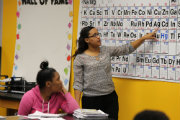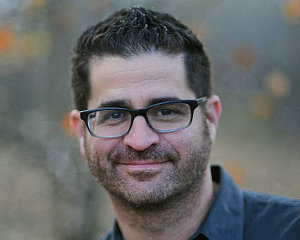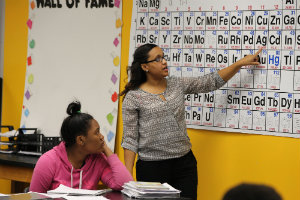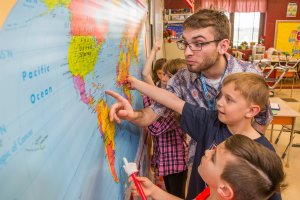Why Teach? It Could Mean More than You Might Imagine


James M. Loy, Miami University
Most people think they know what it means to be a teacher.
But do they? Do you?
“How do we sell something that has a narrative that most people know?” asks Brian Schultz, professor and chair of Miami University’s department of teacher education (EDT). “Because most people come through schooling themselves, they see their own experience as what being a teacher might be all about.”
Unlike most careers, teaching is omnipresent in ways that most other professions are not. After all, most of us grew up learning from different teachers. We’ve spent years moving from classroom to classroom. And, in fact, formative schooling is among the earliest and most common of our shared cultural and social experiences.
So to many, the typical teaching narrative generally includes notions of tests, quizzes, homework, making a few lesson plans, and probably grading some papers. Because that’s how many people remember school. But the echoes of these generic remembrances are often inaccurate, now outdated, or, at the very least, incomplete.
Even if, once upon a time, the idea of teaching did mean standing in front of a class, dictating content to be regurgitated later was somewhat accurate. That’s not true anymore. Times have changed and so have the students. Today, students are no longer considered to be receptacles for knowledge or “banks to be filled.”
And this shift has challenged many conventional notions of education, while also presenting a number of opportunities to evolve what being a teacher in the 21st century actually means.
 Brian Schultz“One of the things that has been going on in the department is a reimagining of what curriculum can be,” Schultz says. “Rather than coming in with this prescriptive body of somebody else’s received wisdom, why not look to the communities, the neighborhoods from which the children are coming up, and use the assets of the community, the cultures of the students and their families as a way to teach the subject matter and disciplines of knowledge as we know it?”
Brian Schultz“One of the things that has been going on in the department is a reimagining of what curriculum can be,” Schultz says. “Rather than coming in with this prescriptive body of somebody else’s received wisdom, why not look to the communities, the neighborhoods from which the children are coming up, and use the assets of the community, the cultures of the students and their families as a way to teach the subject matter and disciplines of knowledge as we know it?”
Schultz -- along with his EDT colleagues across Miami’s College of Education, Health and Society -- are emphasizing what they call a "culturally relevant and contextually responsive” approach to education that marks a progressive shift in the way teachers are being prepared to thrive in a dynamic new educational climate.
So for anyone interested in pursuing a career in education, now might be an ideal time to consider -- or even reconsider -- becoming a teacher.
As a profession, teaching has long been regarded as a venerable part of the social fabric and it’s often viewed as far more than just a “job.” It’s important work that can leave a positive and lasting influence on the lives of others. Teachers prepare, motivate, encourage, and inspire. They help students overcome challenges, foster emotional growth, find purpose, and build healthy relationships with themselves and among their peers. In classrooms and across communities, both professionally and personally, teaching allows individuals to reach out in ways that are highly satisfying and ultimately meaningful.
“There are a lot of students that are seeking out opportunities to provide a transformative experience,” Schultz says. “They want to be able to allow communities and individuals to use their voices in purposeful ways; teaching is one of those ideal places where you can have that kind of impact.”
More than just educators, Schultz also sees teachers as action-oriented change agents who can use creativity, imagination, and ingenuity to empower youth to identify and actively help solve the problems that can uplift their communities, which, he says, also allows the curriculum to “come alive” for both the students and the teacher.
 But if these dynamics can be counted among the more emotionally fulling aspects of the career, then teaching also offers an abundance of more practical and tangible benefits that resonate as well.
But if these dynamics can be counted among the more emotionally fulling aspects of the career, then teaching also offers an abundance of more practical and tangible benefits that resonate as well.
While teaching, unfortunately, is still painted negatively (and somewhat unfairly) for being a relatively lower paid profession. In reality, it’s actually quite competitive. Salary ranges will vary between states, districts, and personal experience. But most teachers still enjoy a comfortable level of economic security, and principals and superintendents can even receive salaries that routinely push beyond six figures.
And this also comes with the added bonus of a great work-life balance.
Having summers off is often a big draw, and many take this time to improve their craft, earn additional income, or to pursue outside interests. This unique perk is also typically offered alongside generous benefits packages, which can include comprehensive retirement plans, a variety of insurance options, additional vacation time, and more.
Plus, the opportunities for employment are continuing to expand. In fact, the U.S. Bureau of Labor Statistics calculates that almost 1.9 million job openings will be available for preschool through college-level school teachers by 2024.
But teaching, for all its merits, does have its challenges too. Bringing out the best in every student can take a lot of time and effort. So teachers must be passionate and committed. They are also excellent listeners and communicators. They are friendly, knowledgeable, and accessible. And, perhaps most importantly, they are agile, adaptive, and responsive agents of change who can impact entire communities in positive and socially just ways.
“That’s what good teachers do,” Schultz says. “They are constantly reflecting on their practice. They are constantly seeking out collaboration, so that they can be transformative.”
So it might not be an easy job and it might not be for everybody. But those who have already answered the call know why it is all worth the effort.
 “The rewards are pretty amazing in terms of engaging with kids on an ongoing basis,” Schultz says. “For me, when you engage with young people, your best self comes out. And nothing is ever the same. Especially when you teach in culturally relevant and responsive ways and adapt to the contexts in which you find yourself. It is pretty fantastic.”
“The rewards are pretty amazing in terms of engaging with kids on an ongoing basis,” Schultz says. “For me, when you engage with young people, your best self comes out. And nothing is ever the same. Especially when you teach in culturally relevant and responsive ways and adapt to the contexts in which you find yourself. It is pretty fantastic.”
So whatever your notions about teaching are, or were, perhaps it’s time to reimagine what they could potentially be. Teaching, at its very core, opens doors to entirely new worlds of exploration and curiosity, and this untapped potential can present unlimited opportunities for discovery throughout every class.
And that can be a very exciting idea.
“What we want to encourage are the possibilities, these endless possibilities of engaging with young people who really get to rethink how it is they see the world,” Schultz says. “We have those possibilities for sure.”

